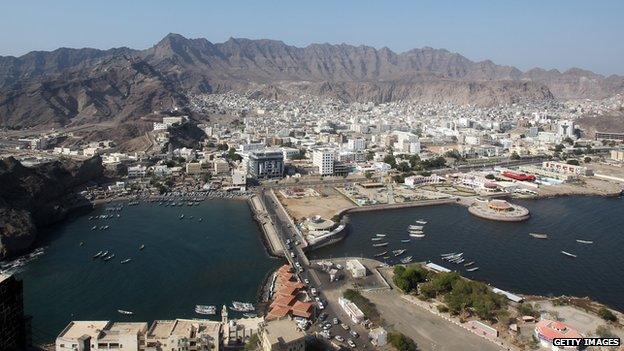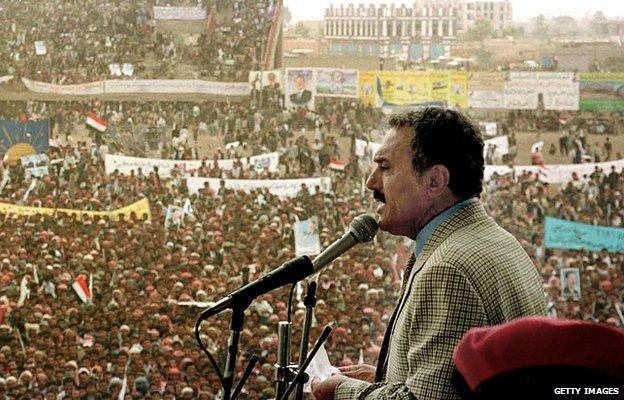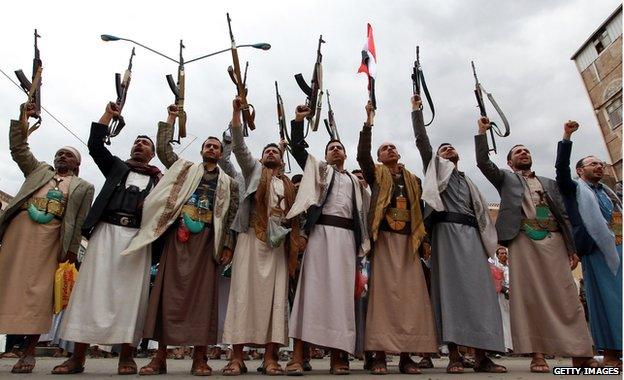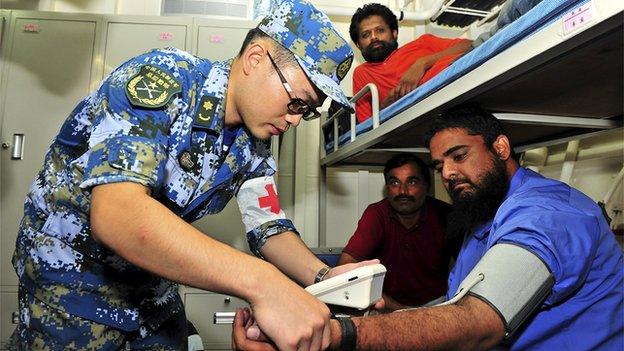Sectarian power grab tears Yemen apart
- Published

Yemen was called 'Happy Arabia' by the Romans
The Romans had a name for Yemen.
They called it Arabia Felix - Happy Arabia - because of its lush, rain-fed mountain scenery.
Today that epithet sounds tragically inappropriate.
Already the poorest country in the Middle East, wracked by soaring unemployment, dwindling oil and water reserves and home to the most dangerous branch of al-Qaeda, now Yemen is being torn apart by war of many sides.
The Saudi-led air strikes began last month, raining down precision-guided missiles on a rebel group called the Houthis who swept down from their mountain stronghold in the far north six months ago, taking town after town, and pushing out the UN-recognised President Hadi.
That alarmed the Saudis and the other Gulf Arab states, especially as they suspect the hand of Iran as being behind the Houthis' spectacular blitzkrieg.
How else, Saudis keep saying to me, could an impoverished group of tribesmen get the training, the weapons and the money to take over half the country?
There's a sectarian angle here too. The Houthi rebels are Zaidi Shias, representing about a third of the population. The Saudi rulers are suspicious of Shias, many of whom look to Iran for spiritual leadership.
Saudi Arabia is a predominately Sunni Muslim country and the Saudis are starting to think they're getting encircled by proxies of Iran wherever they look: in Lebanon, Syria, Iraq and now Yemen.

Ali Abdullah Saleh ruled first North Yemen, then a unified Yemen, for 35 years
Enough, they said, drawing a line in the sand. At a secret summit in a Saudi palace last month they threw together a 10-nation coalition in a belated and possibly doomed Gulf Arab attempt to turn back the Houthi takeover of Yemen and restore their ally to power.
Change of presidents
But in fact the Houthis largely owe their military success to someone much closer to home. They've formed an alliance of convenience, a sort of pact with the devil, with the very man who tried to bomb them out of existence five years ago.
Ali Abdullah Saleh ruled first North Yemen, then a unified Yemen, for 35 years, until he was forced out of power by the Arab Spring protests.
He refused to believe that Yemen was better off without him. So he set about wrecking the peaceful political transition of power that Yemen's friends had worked so hard to engineer.
Whole units of the Republican Guard remained loyal to him, bombs went off and towns were fought over.
President Hadi who replaced him, an elderly, genial southerner, has been no match for Saleh's machinations. He must be rueing the day he agreed to let his predecessor stay on in Yemen.
I interviewed Saleh once, in his fortified palace in the capital, Sanaa. It did not go well.
Speaking in Arabic without a translator, I asked him what he wanted his legacy to be.
The unification of North and South Yemen, of course, he replied, this was his crowning achievement. I thought I would soften him up by asking what benefits this had brought, but the way I said it in Arabic came out as 'well what was the point of that?'

Saudis ask how an impoverished group of tribesmen could have taken over half the country
What? he barked, glaring at me furiously, summoning his official translator, and looking pointedly at his watch.
Effective fighters
As president, Saleh fought six short wars against the Houthis until it ended in an uneasy truce. Now he's cynically using them to destroy those who he sees as usurping his power.
The Houthis are fierce, effective fighters, used to living on little in the black, volcanic mountains that straddle the Saudi-Yemeni border.

When I visited them in their stronghold city of Saada my girlfriend and I were woken on our first morning by a burst of heavy machinegun fire from a pickup truck outside in the street.
"It is celebration," said the man on reception, unfazed. Later we met a pair of brothers who took us out to the mountains to show off their skills with a Kalashnikov.
Chewing the narcotic qat leaf and racing across the desert in a beaten-up old car, they thought it was the biggest joke to swap places behind the wheel while driving at 60 miles an hour.
Their shooting was every bit as wild as their driving and before long a farmer emerged, shouting and cursing. "What the hell are you doing?" he said. "Bullets are coming down all around my sheep!"
Sunni fanatics
I have no idea what dizzy heights those two rose to after that in Yemen's tribal hierarchy, but the Houthis and their allies are now in control of most of the important parts of Yemen, despite more than a week of airstrikes.
If those fail to dislodge them then the Saudis have not ruled out a ground invasion, but everyone knows that carries enormous risks of getting bogged down into a vulnerable army of occupation.

Al-Qaeda seems to be the only force capable of confronting the rebels on the ground
Instead, the Houthis face a more dangerous foe - the jihadists of al-Qaeda. The jihadists are Sunni fanatics and they hate all Shias, including the Houthis.
In Yemen, al-Qaeda seems to be the only force capable of confronting the rebels on the ground.
On Thursday, their ranks were swollen by a jailbreak of dozens of convicted al-Qaeda fighters. Soon they will be rallying the Sunni tribes to join forces and fight the Houthis from the North.
And all the while, the Americans look on from afar, in despair.
Until just a few weeks ago they thought they had a reliable partner in President Hadi. President Obama even held up Yemen as a shining example of a counter-terrorism partnership.
Now that partnership has crumbled to dust, and so too have Yemen's immediate hopes of emerging from this intractable nightmare.
How to listen to From Our Own Correspondent, external:
BBC Radio 4: Saturdays at 11:30 BST
Listen online or download the podcast.
BBC World Service: At weekends - see World Service programme schedule.
- Published3 April 2015
